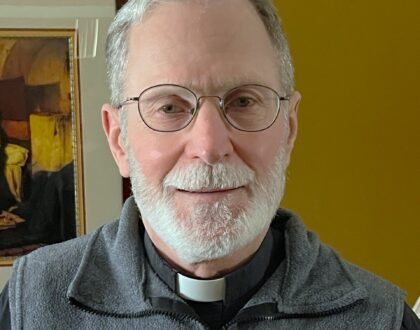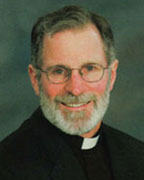Homily, August 4, 2024

From The Pastor
When things are hard, it is easy to complain. When things go well, it is expected they will continue in the same manner. In difficult times, complainers look for someone to blame so the weight of the burden can fall on someone else. When good times reign, that is how it is supposed to be with the expectation that ‘someone’ must keep the good times coming.
The Israelites complained about their slavery at hard labor under the hand of the Egyptian Pharoah. Life was hard with no resolution at hand. God heard the cry of the oppressed and gave answer. Through Moses, the people were stirred to hope in the prophesy and promise of God that would lead them out of Egypt to a Promised Land. It seemed like a dream, but the oppression of slavery led them to trust God in the promise of freedom. Signs came in the form of numerous plagues, sacrifices offered in the promise of a new covenant, door posts marked with the blood of the sacrificial lamb to mark their identity as the angel of death passed-by. They began their journey to freedom in haste with unleavened bread in the hope of a new beginning.
Journeys are hard. Resources fade, inspiration wanes, and the road and direction are uncertain. Worn out, fearful, hungry, and feeling lost, the people complained against Moses. Now it was his fault they were dying of thirst and hunger for the want of decent food. Fear and hunger will do that.
Provident and patient, God sends bread in the morning and meat in the evening. Manna was an unknown food curious and mysterious to the Israelites. In a stroke of comic relief they said, ‘what is this stuff,’ which in Hebrew is the word ‘manha’ or manna. It was bread from heaven, food from God to nourish and sustain the people on their epic journey. Do not forget, much more than a journey of miles from one place to another, this was a spiritual journey initiated by God to a new relationship with God that would make them God’s people. Their freedom was not only new land, but new life in God.
This is the journey of every life. Israel is a metaphor for all nations, all peoples trapped in the slavery of sin, want, and desire for something better. The something better will always be God because things of the world cannot give what God alone can give. Manna is an early sign of Jesus as the Bread of Life.
Jesus is the new covenant fulfilled in the Blood of the Lamb. The dying and rising of Jesus is our freedom from the slavery of sin and undue attachments of this world. All we need for a full life in God is given in the Lord Jesus. Still, the human dynamic of want remains.
Why do we still pine and long for that which we already have? Jesus is the Bread of Life that feeds the soul in its journey to God. The gospel opens a deeper understanding of Jesus as spiritual food. The people have just experienced the multiplication of loaves and fish. They are well fed and satisfied. True to human nature, they are looking for Jesus wanting to know if or when he will do it again. Jesus challenges their motives. They are not looking so much for Jesus as they are for the bread and fish he provided.
“Do not look for food that perishes but for food that endures to eternal life, which the Son of Man will give you.” Jesus is our spiritual food that leads to eternal life in the Father through whom Jesus is given. The people seem to understand asking, “What must we do to accomplish the works of God.” The answer is simple and direct, ‘believe in the One he sent.’
Moses was the agent through whom God sent the manna. Jesus is the agent, the very person of God sent by the Father to be our spiritual bread, the food that will lead to eternal life. “…my Father gives the true bread from heaven.”
The core of the Eucharist is revealed at the Last Supper when Jesus explicitly says of bread and wine, “This is my Body, This is my Blood.” Jesus refers directly to the Cross upon which he gives his body and pours out his blood in the redemptive sacrifice of our salvation. Jesus is the essence of love incarnate. His person and his life, Body and Blood, are fully given and made present in the Holy Sacrifice of the Mass.
Jesus is real food that feeds body, mind, and spirit. How does this work? As Jesus says, “believe in the One whom the Father sent. To believe in Jesus is to invite and allow Jesus to become the meaning and purpose of your life. Through thick and thin, good times and bad, Jesus is ever-present to offer the peace and the providence of Divine care. Does this mean happy ever after? No. It means the constancy and surety of the Lord’s presence in redemptive love. Human nature will have us still complain, blame, and expect a free lunch now and then, but the food of life will be ours in Jesus who is the Bread of Life.
Father John Esper
Recent Sermons

Homily, March 30, 2025
March 27, 2025

Homily, March 23, 2025
March 20, 2025

Homily, March 16, 2025
March 11, 2025

